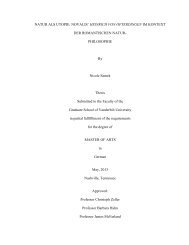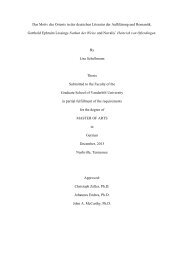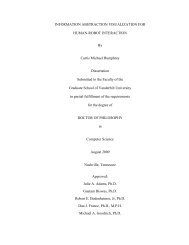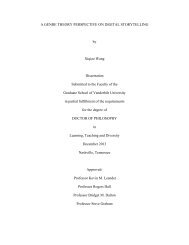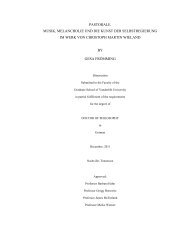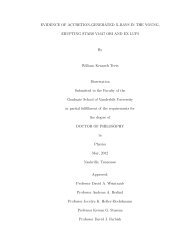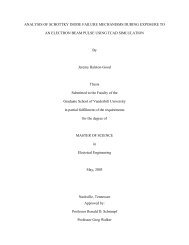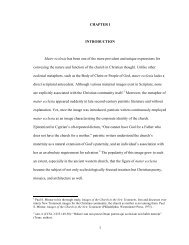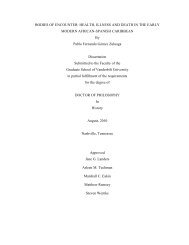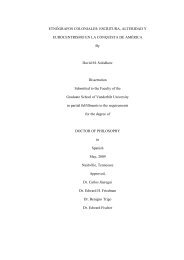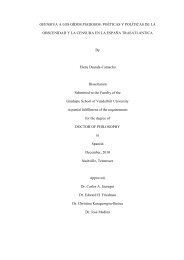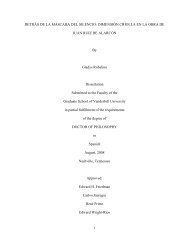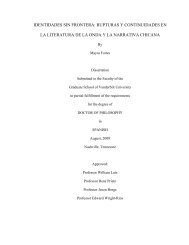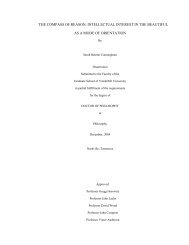THE DEATH OF DIONYSOS - ETD - Vanderbilt University
THE DEATH OF DIONYSOS - ETD - Vanderbilt University
THE DEATH OF DIONYSOS - ETD - Vanderbilt University
You also want an ePaper? Increase the reach of your titles
YUMPU automatically turns print PDFs into web optimized ePapers that Google loves.
It is all the more puzzling, then, when the author of the Confessions insists<br />
repeatedly that her trust in God is founded on experience. The first few times that the<br />
words Erfahrung and erfahren appear in Book Six, they refer to what the narrator learns<br />
from her life in society or in other words, from lived experience. Eventually, though, even<br />
the tender sensations (Empfindungen) that she enjoys whenever she retreats from society<br />
into prayer and reflection come to be equated with experience–her experience of God–<br />
because she learns by experience how to replicate them. She even conducts an alchemical<br />
experiment, as it were, to determine the origin of the cherished sensations. Retreat and<br />
reflection are conducive to spiritual feelings, she discovers; society and “sinnlich[e]<br />
Munterkeit” [“robust sensuality”] are not (364; DWH). She concludes:<br />
Je sanfter diese Erfahrungen waren, desto öfter suchte ich sie zu erneuern,<br />
und ich suchte immer da den Trost, wo ich ihn so oft gefunden hatte; allein<br />
ich fand ihn nicht immer [. . .]. Ich spürte der Sache eifrig nach und<br />
bemerkte deutlich, daß alles von der Beschaffenheit meiner Seele abhing;<br />
wenn die nicht ganz in der geradesten Richtung zu Gott gekehrt war, so<br />
blieb ich kalt. (376ff.)<br />
[My experiences in this quarter were so soothing that I returned there ever<br />
more often, always seeking the consolation that I had found before. But I<br />
did not find it always. (. . .) I asked myself, seeking the reason and coming<br />
to the conclusion that it all depended on the state of my own soul: if it were<br />
not entirely directed straight toward God, I remained unwarmed (. . .) (EAB<br />
229).]<br />
Her single-minded quest for the god of her heart lead her first to give up dancing and more<br />
frivolous social intercourse, and then to break off her engagement to Narziss; later that<br />
same devotion to her personal faith will interrupt her communion with fellow believers<br />
and finally separate her even from her family and relations.<br />
Innerness and Aesthetic Self-Awareness<br />
This rather pessimistic reading of Book Six follows the social logic of Becker-<br />
Cantarino’s contrast of the schöne Seele with her historical model, the gregarious Pietist<br />
von Klettenberg. The analysis of Friedrich Strack could scarcely reach a more different<br />
conclusion. 26 While he diagnoses in the religious convictions of the schöne Seele “eine<br />
26<br />
See Strack, “Selbst-Erfahrung oder Selbst-Entsagung? Goethes Deutung und Kritik des Pietismus<br />
in ‘Wilhelm Meisters Lehrjahre’”, in: Verlorene Klassik? Ein Symposium, ed. Wolfgang<br />
21



